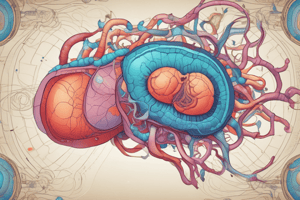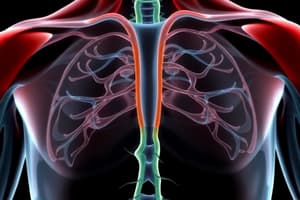Podcast
Questions and Answers
What is the primary function of the endocrine system?
What is the primary function of the endocrine system?
To provide communication within the body and regulate various functions such as growth, development, reproduction, energy use, and electrolyte balance.
Which gland produces cortisol?
Which gland produces cortisol?
- Thyroid
- Adrenal Cortex (correct)
- Pituitary
- Pancreas
Hormones are produced in large amounts and secreted into the bloodstream.
Hormones are produced in large amounts and secreted into the bloodstream.
False (B)
The primary hormone produced by the ovaries is ______.
The primary hormone produced by the ovaries is ______.
Match the following hormones with their respective effects:
Match the following hormones with their respective effects:
What is the role of the hypothalamus in the endocrine system?
What is the role of the hypothalamus in the endocrine system?
Which hormone decreases serum calcium levels?
Which hormone decreases serum calcium levels?
Flashcards are hidden until you start studying
Study Notes
Endocrine System Function
- The endocrine system is a communication network within the body that helps regulate growth, development, reproduction, energy use, and electrolyte balance.
- The nervous system is closely interconnected with the endocrine system to maintain homeostasis within the body.
Endocrine Glands and Hormone Production
- Endocrine glands are specialized collections of cells that produce and secrete hormones.
- Hormones are chemical messengers secreted directly into the bloodstream.
- Adrenal Cortex: Produces cortisol and aldosterone.
- Cortisol increases glucose levels, suppresses inflammation and immune reactions.
- Aldosterone retains sodium and excretes potassium.
- Intestine: Produces secretin and cholecystokinin.
- These hormones decrease gastric movement and stimulate bile and pancreatic juice secretion.
- Kidney: Produces erythropoietin and renin.
- Erythropoietin increases red blood cell production.
- Renin increases blood pressure and vascular volume.
- Ovaries: Produce estrogen and progesterone.
- These hormones promote secondary female sex characteristics and prepare the female body for pregnancy.
- Pancreas (Islet of Langerhans): Produces insulin, glucagon, and somatostatin.
- These hormones regulate glucose and fat metabolism.
- Parathyroid Gland: Produces parathyroid hormone.
- This hormone increases serum calcium levels.
- Pineal Gland: Produces melatonin.
- Melatonin affects the secretion of hypothalamic hormones, specifically gonadotropin-releasing hormone.
- Placenta: Produces estrogen and progesterone.
- These hormones facilitate fetal growth and development and prepare the body for delivery.
- Stomach: Produces gastrin.
- Gastrin stimulates stomach acid production.
- Testes: Produce testosterone.
- Testosterone promotes secondary male sex characteristics.
- Thyroid: Produces thyroid hormone and calcitonin.
- Thyroid hormone stimulates the basal metabolic rate.
- Calcitonin decreases serum calcium levels.
Hormones
- Hormones are chemicals produced in the body that meet specific criteria:
- Produced in small amounts
- Secreted directly into the bloodstream
- Influence normal metabolic cellular processes by reacting with specific receptor sites
- Rapidly broken down
Hypothalamus
- The hypothalamus is the coordinating center for nervous and endocrine responses to internal and external stimuli.
- It monitors the body's homeostasis by analyzing input from the periphery, the central nervous system, and coordinating responses through the autonomic, endocrine, and nervous systems.
- The hypothalamus contains neurocenters that are sensitive to specific stimuli.
- It regulates:
- Body temperature
- Thirst
- Hunger
- Water retention
- Blood pressure
- Respiration
- Reproduction
- Emotional reactions.
- The hypothalamus receives input from the following:
- Limbic system
- Cerebral cortex
- Cranial nerves (smell, sight, touch, taste, hearing)
- Emotions and thoughts
- The hypothalamus produces and secretes releasing hormones that stimulate the pituitary gland:
- Growth hormone
- Somatostatin (release-inhibiting factor)
- Prolactin (PRL)-inhibiting factor
- The hypothalamus is connected to the pituitary gland by two networks:
- Vascular capillary network: carries hypothalamic hormones to the pituitary gland
- Nerve fiber network: transmits nerve impulses from the hypothalamus to the pituitary gland.
Studying That Suits You
Use AI to generate personalized quizzes and flashcards to suit your learning preferences.




